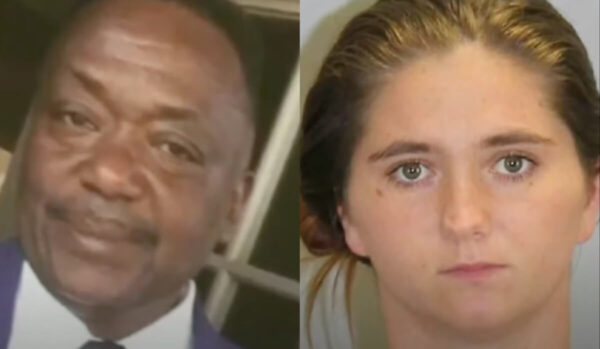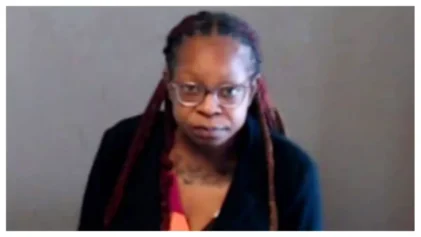A white woman who chased down and fatally shot a Black man after a hit-and-run crash near Atlanta four years ago was sentenced to life in prison with the chance for parole.
She avoided a more severe term after the victim’s family claimed race was a motivating factor in the killing.
Hannah Renea Payne learned her fate on Dec. 15 after a Clayton County jury deliberated for less than two hours, finding her guilty in the 2019 killing of 62-year-old Kenneth Herring.

After the five-day trial, Payne was convicted on multiple counts, including felony murder, malice murder, aggravated assault, false imprisonment, and three counts of possession of a firearm during the commission of a felony. However, some charges were combined or dismissed to accommodate the life sentence plus 13 years handed down by Clayton County Superior Court Judge Jewel Scott.
Despite the overt racial undertones of the case, prosecutors opted not to pursue hate crime charges against Payne. This decision, noted by Herring’s relatives, was made despite Payne having a Black boyfriend at the time of the shooting, which they felt contradicted the criteria to prove a hate crime.
From the outset, the shooting case triggered speculation about whether racism played a role in motivating Payne to chase down and shoot Herring or if it was simply a case of vigilante justice gone tragically wrong.
“We never, ever brought race into this matter… that was too simple to say that it was Black and white,” District Attorney Tasha Mosley said, according to The Atlanta Journal-Constitution. “We sat in our office for four years, having these discussions and trying to figure out why. Only Hannah Payne knows why she did it… We will never know because she never really told us the truth on the stand. That story kept changing.”
Herring’s family expressed dissatisfaction with the sentence as prosecutors did not pursue hate crime charges. They continue to live with the pain of his death after more than four years.
“Knowing that I can’t see him again, I would like her to have the same thing,” Herring’s sister, Jacquelin Herring, told the court. “He got a life sentence that he did not ask for. As I watched her leaving out, and she was crying as she was going through those doors, that’s the same way I felt when they closed that casket on him. That door would never open again. I will never see my brother again, only through pictures.”
A harrowing series of circumstances, including a minor crash and a brief car chase, led to the fatal encounter between Payne and Herring on May 7, 2019.
At the time, Payne called 911 to report that she witnessed Herring’s pickup truck clip another vehicle near Clark Howell Highway. This prompted her to tail Herring through traffic for about a mile before the pursuit reached the intersection of Riverdale Road and Forest Parkway.
There, Payne blocked Herring’s path with her Jeep before jumping out with a loaded gun to confront the man over the initial hit-and-run that had nothing to do with Payne.
During the face-off, Payne, who was 21 at the time, opened fire on the unarmed Herring, who was still inside his truck and possibly experiencing a medical emergency, prosecutors said.
Payne also shrugged off instructions from dispatchers to remain at the scene of the earlier accident and to not make contact with the truck driver, prosecutors said. A witness at the scene recorded a video that appeared to show Payne switching clothes before police arrived.
During her testimony, Payne expressed regret for shooting Herring, but prosecutors believe she lied about the events leading up to the shooting. This resulted in major inconsistencies in the story she gave investigators, maintaining that Herring had essentially shot himself during a struggle over the gun.
“She has yet to tell a consistent story about what happened,” Chief Assistant District Attorney Bonnie Smith told the judge during the trial. “Every time she told the story in her interview, it changed. It was different here. It was different in the back of the patrol car because she accepts no responsibility for her own actions.”
Smith, who is also white, acknowledged that her office considered the racial aspects of the case but concluded that they couldn’t prove hate on Payne’s part.
“We’ve certainly debated… would we be here if the person behind the wheel of that beat-up truck was me? Or someone that looked like me?” Smith said. “We don’t know that. We’ve certainly had those conversations, but again… to make it about race was to simplify it too far.”
During the trial, defense attorney Matt Tucker claimed Payne had tried to help police by getting Herring’s tag number after he left the scene of an accident. Tucker argued that Payne only got out of her Jeep to demand that Herring return to the crash site, but instead, he grabbed Payne’s gun and was killed.
“It’s a shame that somebody who has good in her heart is no longer going to want to help anybody because, for lack of a better saying, ‘No good deed goes unpunished,’” Tucker said Friday as he called on the judge for leniency in Payne’s case.
A host of friends and family members stood up for Payne on the witness stand, hoping to persuade the judge to potentially soften the sentence based on her otherwise commendable character. However, prosecutors remained unmoved.
“The real Hannah Payne is the person who said, ‘I’m safe, but he ain’t,’” Smith said. “We do not believe, judge, that this is a case where the minimum sentence is appropriate.


